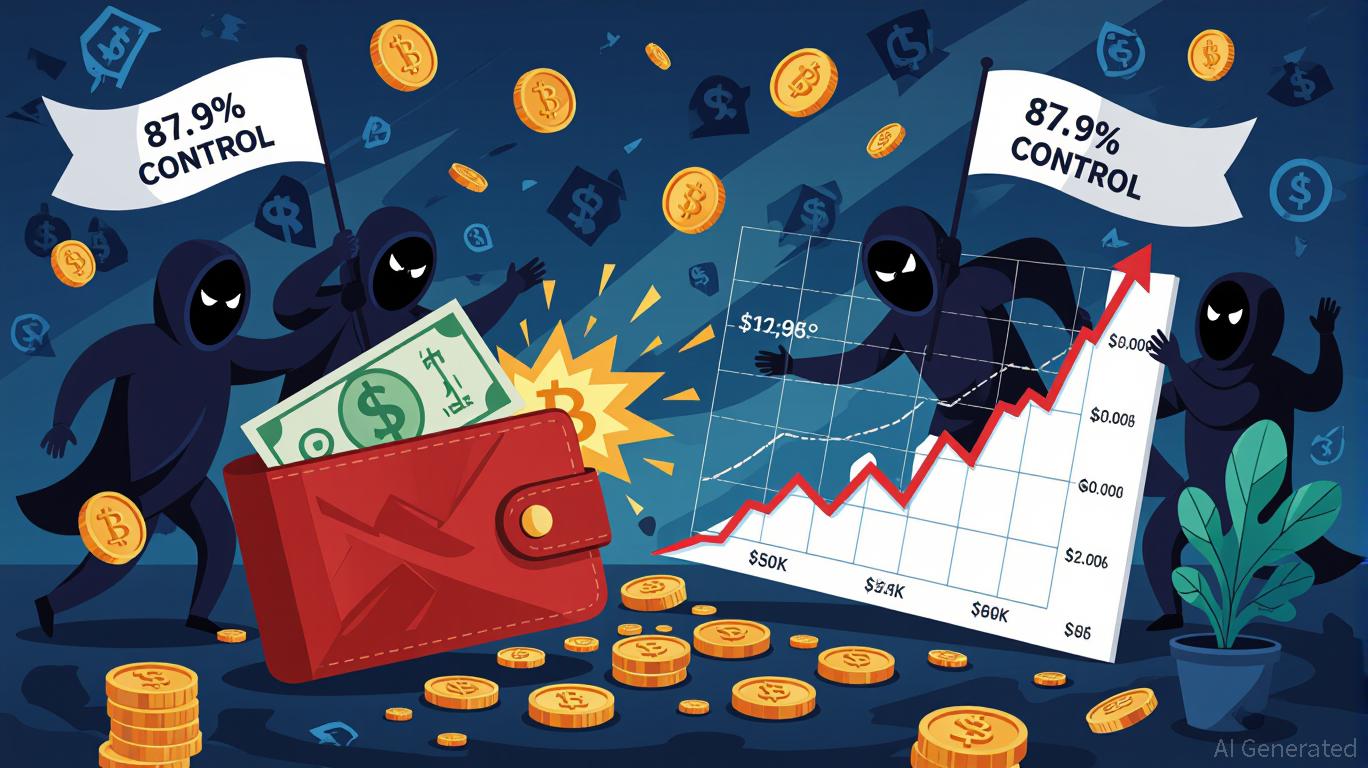COAI Token Fraud Aftermath and Safeguarding Investors in Cryptocurrency: Addressing Compliance Preparedness and Strategies for Reducing Risks
- COAI token's 2025 collapse erased $116.8M for C3.ai, exposing DeFi's systemic risks from algorithmic stablecoin failures and centralized control. - U.S. regulators modernized crypto oversight via SEC no-action letters and CFTC policy shifts, but fragmented frameworks persist between agencies. - Retail investors now rely on blockchain analytics tools and real-time fraud detection platforms to combat scams, as EU's MiCA regulation sets global benchmarks. - Post-COAI reforms emphasize balancing innovation w
COAI Token’s Deceptive Design and Systemic Threats
The downfall of the COAI token stemmed from its dependence on algorithmic stablecoins—xUSD and deUSD—which

These problems were made worse by the uncertainty introduced by the CLARITY Act, which
Regulatory Preparedness: Progress and Remaining Challenges
Following the COAI debacle and broader crypto-related threats, U.S. regulators have begun updating their oversight. In September 2025, the Securities and Exchange Commission (SEC)
The Commodity Futures Trading Commission (CFTC) has also worked to clarify regulations,
On the global stage, the EU’s Markets in Crypto-Assets (MiCA) regulation has set a new standard for comprehensive oversight, though aligning it with U.S. rules remains challenging. Meanwhile, international cooperation—such as the U.S.-China operation that
Investor Protection: From Pre-Transaction Screening to Advanced Technology
Specialists stress that individual investors need to use multiple layers of defense against crypto fraud. Conducting checks before transactions—such as confirming the legitimacy of platforms and using blockchain analytics to spot suspicious wallets—is essential for reducing risk
Technology-based protections are also growing. NordVPN’s call protection, now offered in the UK and Canada,
Looking Ahead: Striking a Balance Between Innovation and Regulation
The downfall of the COAI token stands as a warning for both regulators and investors. Although the U.S. has updated some crypto regulations—like the SEC’s Project Crypto—there are still gaps in enforcement and coordination between agencies
In the end, the post-COAI era calls for a careful balance: encouraging technological progress while ensuring regulations keep pace with new risks. As the crypto industry evolves, the lessons from COAI are likely to help build a more robust system—one where investor protection is central, not an afterthought.
Disclaimer: The content of this article solely reflects the author's opinion and does not represent the platform in any capacity. This article is not intended to serve as a reference for making investment decisions.
You may also like
Stablecoin Market Exceeds $280B as ECB Warns of Potential Systemic Risks
- Stablecoin market exceeds $280B, driven by regulatory clarity and institutional adoption, capturing 8% of crypto assets. - ECB warns of systemic risks from stablecoin concentration, de-pegging events, and mass redemption "runs" threatening global markets. - USDC overtakes USDT in onchain activity due to regulatory alignment, with Circle's market cap rising 72% YTD to $74B. - ECB calls for global regulatory coordination to address cross-border arbitrage gaps and prevent destabilizing retail deposit shifts

Bitcoin News Update: MicroStrategy Faces an Identity Dilemma—Is It a Technology Company or a Bitcoin Holding Entity?
- MicroStrategy faces potential MSCI index reclassification as a Bitcoin investment vehicle, risking $8.8B in passive fund outflows. - The debate centers on whether crypto-heavy firms should be classified as operating businesses or passive funds, impacting capital access and valuation. - CEO Michael Saylor defends MSTR as a "structured finance company," leveraging Bitcoin-backed securities to differentiate from passive vehicles. - Compressed stock-to-NAV multiples and Bitcoin's price slump threaten MSTR's

Japan Sets Out to Rebuild Investor Confidence in Crypto Following Significant Security Breaches
- Japan's FSA will mandate crypto exchanges to hold liability reserves proportional to trading volumes and security risks, modeled after traditional securities safeguards. - The reform responds to major breaches like the 2024 DMM Bitcoin hack ($312M stolen) and allows exchanges to offset reserve costs via insurance policies. - New rules require segregating user funds from corporate assets and reclassify crypto as securities under the Financial Instruments Act to enable investment products. - Experts view t

Bitcoin News Today: Bitcoin's Rebound Fails to Ease Crypto's Liquidity Crunch
- Bitcoin's $80,000 rebound failed to reverse crypto's liquidity crisis as structural risks deepen amid macroeconomic pressures and thinning market liquidity. - Total crypto market cap fell below $3 trillion with $950M+ liquidations, while Bitcoin's dominance dropped below 49% as capital rotated into altcoins like HBAR and HYPE. - Institutional divergence emerged: spot ETFs saw $1.38B redemptions while on-chain accumulators added 42,000 BTC, contrasting with long-term investors offloading ~42,000 BTC this
